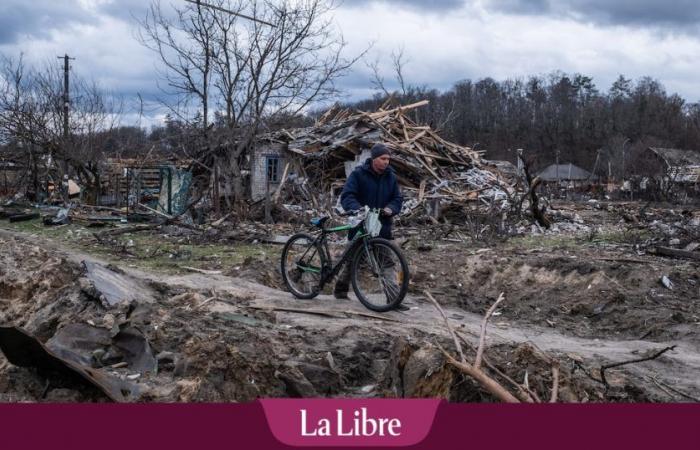Several weeks ago, Oleksandr Los, like the rest of the inhabitants of the Sumy and Chernihiv oblasts, watched helplessly as the waters of the Desna and the Seim – one of its tributaries – were poisoned and the ecological catastrophe that followed. “The first signs of pollution of the Seim River were detected by colleagues in the Sumy region on August 14. An unpleasant smell emanated from the river, which passes through the Kursk region of Russia, and the color of the water darkened.”
War in Ukraine: Putin shapes a new Russian elite with war veterans
According to the Ukrainian authorities, this pollution emanates from Russia and is the result of poisoning.intentional” of the Seim River. During a press conference organized on September 10, Ukrainian Prime Minister Denys Shmyhal named a sugar factory located in Tyotkino, Russia, as responsible for this pollution peak. The industrial complex, located less than three kilometers from the border with Ukraine, is believed to have intentionally discharged wastewater into the Seim on two occasions, leading to a sudden collapse in the oxygen level in the river and the sudden deaths of thousands of people. aquatic creatures and plants.
Abnormally dark water
Met on Saturday October 5 in Chernihiv, capital of the eponymous region, Oleksandr Los guides us to a picnic area located not far from the city center, where the bank flattens out and forms a small beach. The area is deserted, the water there seems abnormally dark. He kneels, then dips his hand in, running his index finger along the riverbed. His finger comes out covered in a blackish material: “All indicators have now returned more or less to normalhe explains. This organic matter is one of the negative effects of this pollution, but it should not constitute a danger.”
About ten meters from us, a man in his forties undresses and walks slowly into the waters of the Desna, visibly indifferent to the recent episode of pollution. Alerted by their colleagues in Sumy, the local authorities of Chernihiv had imposed at the end of August a ban on fishing, swimming or using the waters of the river to water gardens and agricultural land. According to the Ministry of Environmental Protection and Natural Resources of Ukraine, however, the situation on the Desna is “stabilized” as of September 22. “Along its entire length in Chernihiv Oblast, the water has cleared up, and in some places there are no dark-colored sediments at the bottom, no unpleasant odor, no fish kills“, the ministry then declared in a press release published on social networks.
How Russia recruits soldiers, willingly or by force: “Ukraine is never mentioned, nor is patriotic duty”
“If he takes a shower he should be fine.”
“If he takes a shower as soon as he gets home, it should have no impact on his health”confirms Los, nodding towards the man doing breaststroke laps in the dark waters. The pollution could, however, have long-term consequences on the ecosystems of the two rivers. “According to scientists, it will take between 3 and 5 years for the number of fish in the Desna to return to their former levels.says Oleksandr Los. On October 2, the environmental defense organization WWF for its part described the situation as “very worrying”adding that WWF-Ukraine experts had “observed the death of the species of red-book sturgeon that had survived in the reservoirs of these rivers against all odds.”
For our guide, there is no doubt, this poisoning is not accidental. “I think it was a planned action aimed, if not at destroying, at least at considerably complicating our liveshe sighs. Our border guards use drones to monitor the territory of the Kursk region and they have photo and video confirmations. I am not able to show them to you, but we have proof that the dam located in Tyotkino was not damaged.”
Russian war in Ukraine ‘is not a military operation, it is pure and simple terrorism’
More than 4,700 environmental crimes
The pollution peak in fact coincided with the start of the Ukrainian offensive in the region bordering Kursk, in Russia. The destruction of the Tyotkino dam or the sugar factory during these battles had, for a time, been cited as potential causes of this poisoning. “There is a dam near the village of Tiotkino, which keeps the water level about 1.5-2 meters higher for the needs of local industry. And the waste was thrown below the dam. They used us as a dumping ground”, tranche Oleksandr.
If the intentional nature of this pollution were demonstrated, this crime against the environment would only be the latest in a long series. During a visit to Azerbaijan, the Ukrainian Commissioner for Human Rights, Dmytro Loubinets, declared that Russia had committed “more than 4,700 environmental crimes in Ukraine” since its large-scale invasion began in February 2022, causing an estimated $64 billion in damage. The war has spared almost no ecosystem in the country, polluting rivers and groundwater, destroying thousands of hectares of forests and contaminating vast areas of agricultural land in the south and east of the country with mines, unexploded shells and heavy metals as well as chemicals contained in these munitions.
According to the Ministry of the Environment, approximately 425,000 hectares of forests across the country have been affected by pollution from mines and unexploded shells (UXO). To mark Climate Week, a new report commissioned by the humanitarian organization International Rescue Committee estimates that Moscow’s war against Ukraine has generated 175 million tonnes of greenhouse gases. Which would amount to “more pollution in two years than the combined emissions of the five most climate-vulnerable countries on the IRC watch list.” Namely Haiti, Syria, Burkina Faso, Yemen and Somalia, which together emitted 169 million tonnes in 2022. According to the report, almost 29% of Ukraine’s territory needs to be demined, an area “equivalent to that of the American state of Florida or Greece.”






